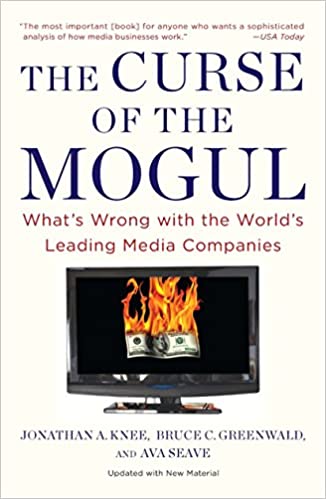304 pages
English language
Published Nov. 19, 2009 by Portfolio.

304 pages
English language
Published Nov. 19, 2009 by Portfolio.
If Rupert Murdoch and Sumner Redstone are so smart, why are their stocks long-term losers? We live in the age of Big Media, with the celebrity moguls at the helms of the media conglomerates telling us that "content is king" and "growth is good." But for all the excitement, glamour, drama, and publicity they produce, why can't these moguls and their companies manage to deliver the kind of returns you'd get from closing your eyes and throwing a dart? In The Curse of the Mogul, Jonathan A. Knee, Bruce C. Greenwald, and Ava Seave lay bare the inexcusable financial performance that lies beneath Big Media's false veneer of power. In an industry built on celebrity, mogul-fueled megalomania has run rampant, with shareholders footing the bill. Moguls have successfully propagated a myth that both makes them appear indispensable to the business and justifies their lousy performance: since they are managers of …
If Rupert Murdoch and Sumner Redstone are so smart, why are their stocks long-term losers? We live in the age of Big Media, with the celebrity moguls at the helms of the media conglomerates telling us that "content is king" and "growth is good." But for all the excitement, glamour, drama, and publicity they produce, why can't these moguls and their companies manage to deliver the kind of returns you'd get from closing your eyes and throwing a dart? In The Curse of the Mogul, Jonathan A. Knee, Bruce C. Greenwald, and Ava Seave lay bare the inexcusable financial performance that lies beneath Big Media's false veneer of power. In an industry built on celebrity, mogul-fueled megalomania has run rampant, with shareholders footing the bill. Moguls have successfully propagated a myth that both makes them appear indispensable to the business and justifies their lousy performance: since they are managers of creative talent and artistic product, being subject to appraisal using traditional strategic, financial, or operational metrics is just unfair, isn't it? But the stark facts speak for themselves:Since 2000, the largest media conglomerates have lost $200 billion in market capitalization from their collective balance sheets—making Citigroup's red ink look like a pale blush.These media companies have consistently underperformed for over a generation—not just since the Internet emerged as a competitive force but for the decade before anyone ever heard of "new media."Misguided investment and acquisition strategies have created the paradox that, in media, the faster revenues grow, the worse the stocks perform.By rigorously examining individual media businesses on their own terms, the authors point out the difference between judging a company by how many times it's CEO is seen in Sun Valley and by whether it generates consistently superior profitability. The book is packed with enough sharp-edged data to bring the most high-flying, hot-air-filled mogul balloon crashing down to earth.